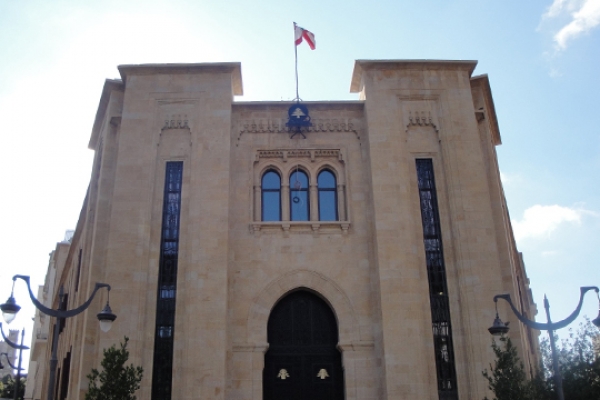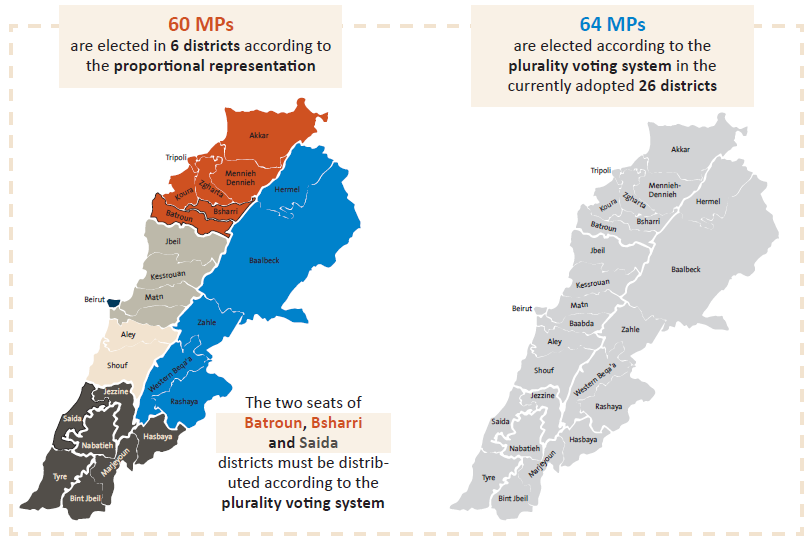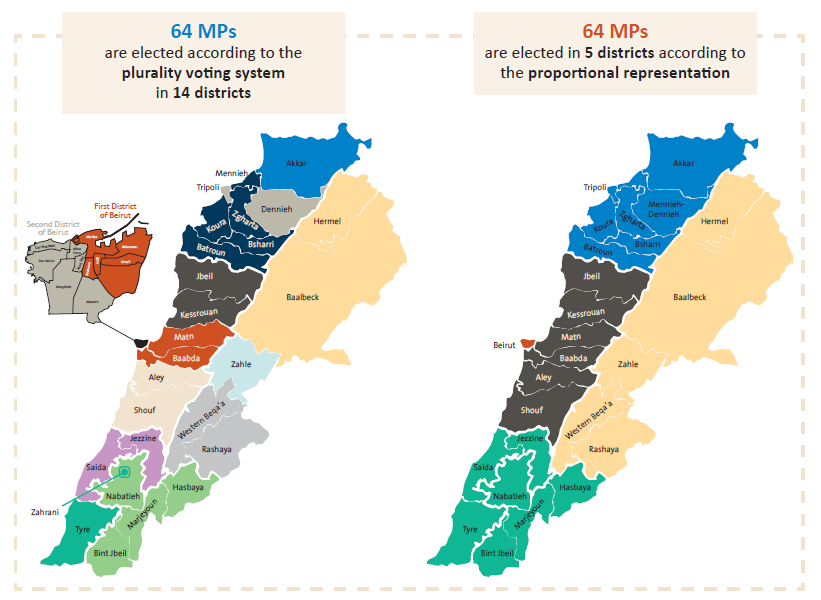Bills and Proposals of Parliamentary Electoral Laws
More than 24 bills and proposals of parliamentary electoral laws are being discussed today. This number may increase every day and every week, from now on until the adoption of the law that is supposed to take place before expiration of Parliament’s mandate on June 20, 2017.
However, the main debates are about the many versions of law that may be adopted as they are or after being amended. What is new in these proposals is the adoption of proportional representation in whole or in part in the parliamentary elections, and not the plurality voting system that has been used in the parliamentary elections since the independence.
Bill of Najib Mikati’s Government
This bill was adopted at the government session on August, 7, 2012. Its key articles are the following:
• To adopt a proportional voting system that gives each electoral list a number of seats and the number of votes it receives.
• To vote by means of prepared papers.
• To adopt two preferential votes. This can detect the most popular MPs.
• To adopt a gender quota so that each list includes at least one candidate of the opposite gender without any guarantee to win. This quota is for candidates and not for winning the elections.
• To divide Lebanon into 13 electoral districts.
It is noteworthy that these divisions have promoted the dominance of sects in districts instead of finding mixed districts:
• 4 Sunni-majority districts comprising 34 MPs:
- The Second District of Beirut
- West Beqa’a and Rashaya
- Tripoli
- Akkar and Mennieh-Dennieh
• 3 Shiite-majority districts comprising 33 MPs:
- South
- Nabatieh
- Baalbeck-Hermel
• 3 Shiite-majority districts comprising 32 MPs:
- Bsharri, Batroun, Koura, and Zgharta
- Baabda and Matn
- Jbeil and Kessrouan
• 2 Christian-majority districts comprising 16 MPs:
- Zahle
- First District of Beirut
• One Druze-majority district comprising 13 MPs:
- Aley and Shouf
The Orthodox Proposal
Hereunder the text of the proposal submitted by Change and Reform bloc MPs Alain Aoun and Neemtallah Abi Nasr on September 10, 2012:
• The proportional representation is adopted in the parliamentary elections.
• Lebanon is one single district.
• The MPs allotted to each sect are elected by the voters of the same sect. For example, there are 34 Maronite MPs in Lebanon. All Lebanese Maronite voters cast for the list of 34 Maronite candidates distributed according to the Aqdiyah, e.g. 2 from Batroun and 5 from Kessrouan, as they cannot be from the same region.
• The electoral lists are registered at the Ministry of Interior and Municipalities within 40 days prior to the date set for elections.
• The voters cast their ballots using the official ballot papers prepared beforehand by the Ministry of Interior and Municipalities.
• Jewish voters (with no MP) are entitled to vote for Muslim and Christian candidates.
• Every voter shall cast one preferential vote for a candidate on the list for which he/she voted.
Limited Voting
Limited voting is a proposal prepared by the Maronite league. It is based on:
• The adoption of the current electoral divisions, i.e. Lebanon consists of 26 electoral districts.
• The adoption of the plurality voting system.
• The redistribution of seats by moving the Maronite seat of Tripoli to Batroun and the two Evangelical and Minorities’ seats from the Third District of Beirut to the First District of Beirut.
• Each voter shall vote for one candidate if the district in which he/she votes has only 3 MPs. He/she shall vote for two candidates if the district in which he/she votes has 4 to 6 MPs, and for three candidates if the district in which he/she votes has 7 to10 MPs.
One Vote
Kataeb party Chief MP Sami Gemayel suggested the adoption of an electoral law based on “the one-man-one-vote system”. Apart from the number of MPs in the electoral districts, the voters are equal. They shall only vote for one MP.
MP Ali Bazzi’s Proposal
Development and Liberation bloc MP Ali Bazzi proposed on February 6, 2013 a parliamentary electoral law that is based on the following:
• 64 MPs are elected in 6 districts according to the proportional representation:
- Beirut: 10 MPs
- North Lebanon: 14 MPs
- South Lebanon: 11 MPs
- Beqa’a: 11 MPs
- North Mount Lebanon (Jbeil-Kessrouan-Matn): 8 MPs
- South Mount Lebanon (Shouf-Aley-Baabda): 10 MPs
• 64 MPs are elected according to the plurality voting system in the currently adopted 26 districts.
One of the fundamental flaws of this law is that it adopts different criteria in distributing the seats according to sects and districts. In the Third District of Beirut (10 MPs), the Future Movement has a strong power. It has kept 2 seats according to the plurality voting system and 8 seats according to the proportional representation. As for Zahle, 5 seats were kept according to the plurality voting system and 2 seats according to the proportional representation.
The Proposal of Lebanese Forces- Future Movement- Progressive Socialist Party
This proposal is based on the distribution of seats between the two voting systems:
• 60 MPs are elected in the districts according to the proportional representation as specified in the proposal of MP Ali Bazzi (i.e the Mohafazat). Mount Lebanon district is divided into two districts. Baabda shall be within North Mount Lebanon district and South Mount Lebanon shall be only composed of the two districts of Shouf and Aley.
• 68 MPs are elected in 26 electoral districts according to the plurality voting system.
• The seats are differently distributed. The two seats of Batroun, Bsharri, and Saida districts must be distributed according to the plurality voting system. However, according to the proposal of MP Ali Bazzi, these seats are equally distributed between the two proportional and plurality voting systems.
• The voters cast their ballots using the official ballot papers prepared beforehand by the Ministry of Interior and Municipalities.
• The voters cast for a closed list according to the proportional voting system. They are entitled to cast a preferential vote for one candidate within the list.
Qualifying Vote
This proposal has not been officially developed. It is a preliminary version approved by the Parliament Speaker Nabih Berri and FPM Chief Gebran Bassil. Its key articles are the following:
• The electors of each sect shall vote within the district to twice the number of MPs according to the plurality voting system. In Jezzine, for example, there are 3 MPs (2 Maronite and 1 Greek Catholic). The Christian electors vote for 6 candidates: 4 Maronite and 2 Greek Catholic, and no Muslim elector votes for any candidate. In Saida, Muslim electors (Shia’a and Sunni) vote for 4 Sunni candidates, i.e. twice the number of seats, and no Christian elector votes. In South Lebanon Mohafaza, the proportional representation is adopted and all electors vote for the lists qualified at the Qada’a level. In this way, Lebanon will have at the first qualified phase of elections 256 candidates of which 128 will be elected in the second phase.
The Last Proposal
As the last proposal of electoral bills, the head of FPM submitted a new bill that is based on the following:
• The voters vote for 64 MPs in 5 electoral districts (the five historic Mohafazat) according to the proportional representation. Every voter shall cast a preferential vote for the candidates of the district he/she belongs. Discussions are held to develop this version so that the 64 MPs will be elected based on the principle of “Lebanon is one electoral district”.
• The voters vote for 64 MPs in 14 electoral districts according to the plurality voting system, provided that each sect elects its MPs. This is a radical modification of the Orthodox proposal.
As for the districts, they are:
- The First District of Beirut (the first and the second district of Beirut)
- The Second District of Beirut (the former third district of Beirut)
- Shouf and Aley - Baabda and Matn
- Jbeil and Kessrouan
- Akkar
- Tripoli and Dennieh
- Batroun, Koura, Bsharri, Zgharta, and Minnieh
- Zahle
- Baalbeck and Hermel
- West Beqa’a and Rashaya
- Saida and Jezzine
- Tyre and Zahrani
- Nabatieh, Bint Jbeil, Marjeyoun, and Hasbaya
We are less than 80 days away from the end of Parliament’s mandate. We might witness during this period many different versions of parliamentary electoral bills, but what is even more important is to adopt a new electoral law that ensures the validity and the credibility of representation and schedules the elections. So when will the elections be held? In October 2017 or in May 2018?


.PNG)








Leave A Comment